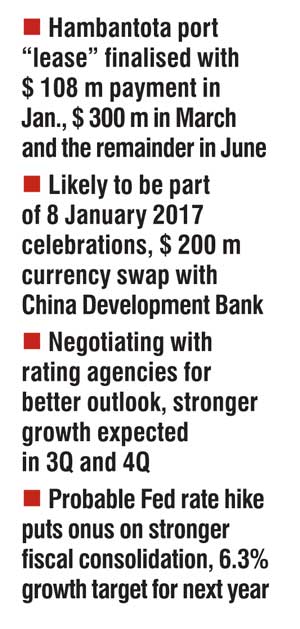Thursday Feb 19, 2026
Thursday Feb 19, 2026
Wednesday, 30 November 2016 00:00 - - {{hitsCtrl.values.hits}}
Central Bank Governor Dr. Indrajit Coomaraswamy
- Pic by Lasantha Kumara
By Uditha Jayasinghe
 A highly disciplined and predictable monetary policy would be central to maintaining growth in a post-Fed rate hike world, observed Central Bank Governor Dr. Indrajit Coomaraswamy yesterday, remaining confident of growth fired by private sector expansion and investment.
A highly disciplined and predictable monetary policy would be central to maintaining growth in a post-Fed rate hike world, observed Central Bank Governor Dr. Indrajit Coomaraswamy yesterday, remaining confident of growth fired by private sector expansion and investment.
Explaining the decision by the Monetary Board to maintain the Standing Deposit Facility Rate (SDFR) and the Standing Lending Facility Rate (SLFR) of the Central Bank unchanged at 7.00% and 8.50% respectively this week the Governor pointed out that private sector sentiment had become more bullish resulting in stronger third and fourth quarter growth for 2016.
“The high probability of a rate hike is baked into the market already with money already flowing out but we would have to see how aggressively rates will be implemented. Given the high infrastructure and other expenditure outlined by the new US president, interest rates are likely to be steep. This would put greater emphasis on prudent monetary policy for Sri Lanka,” Dr. Coomaraswamy said.
However, if Sri Lanka manages to maintain forward-looking policies and remains dedicated to fiscal consolidation the country is likely to navigate existing space to continue growth, the Governor noted, predicting growth rates of about 6.3% in 2017. The targeted growth rate of 5.3% for 2016 would also be possible given the economic pickup in the third and fourth quarters.
Policy consistency, a strong Budget and a planned $ 1 billion infusion from the Hambantota habour deal with China will give the Sri Lankan economy a boost early next year, Dr. Coomaraswamy told reporters. The Central Bank is also working with rating agencies to improve Sri Lanka’s rating and authorities were “not unhopeful” of a positive result.
“My understanding is that the Hambantota habour deal has been finalised with $ 108 million payment in January, $ 300 million in March and the remainder paid in June. The Government also has additional plans to divest non-strategic assets. Money coming in this manner is helpful to build reserves and hopefully pay down rupee debt.”
According to the Governor, the Government is likely to hold a large-scale event in Hambantota to celebrate the second anniversary of President Maithripala Sirisena’s victory on 8 January and roll out several Chinese investment projects including what he termed as a 99-year lease agreement on the Hambantota port. Dr. Coomaraswamy also said the final touches were being put on a $ 200 million currency swap with China Development Bank with legal documents being referred to the Attorney General’s department.
According to the Monetary Report released by the Central Bank, growth of credit extended to the private sector by commercial banks decelerated considerably during September 2016 in response to monetary policy measures adopted by the Central Bank since end-2015.
Year-on-year growth of private sector credit by commercial banks was recorded at 25.6% in the month of September 2016 compared to 27.3% in the previous month. Despite the deceleration in credit extended to the private sector, broad money (M2b) growth accelerated to 18.4%, year-on-year, in September 2016 in comparison to 17.3% recorded in the previous month, as borrowings by the public sector from commercial banks expanded during the month. In the meantime, rupee liquidity conditions in the domestic money market have returned to a balanced level, which will help stabilise market interest rates at current levels.
Headline inflation as measured by both the National Consumer Price Index (NCPI) and Colombo Consumers’ Price Index (CCPI) remained stable at around mid-single-digit levels in October 2016. Further, core inflation based on both NCPI and CCPI remained unchanged in October 2016 compared to the previous month. The adjustments made to the tax structure by the Government are expected to have a one-off impact on inflation from November 2016 while the overall impact of the Budget 2017 on inflation is estimated to be favourable. Aggregate demand pressures are expected to remain well contained supported by the pre-emptive monetary policy measures coupled with the continuation of the envisaged fiscal consolidation process and as a result inflation is expected to remain stable at a mid-single-digit level in the period ahead.
On the external front, the deficit in the trade balance contracted by 12.0% year-on-year in September 2016 as export earnings recorded a growth for the second consecutive month amidst the contraction in expenditure on imports. Earnings from tourism were estimated to have increased by around 14.6% during the first ten months of 2016, while workers’ remittances recorded a growth of 3.5% during the same period.
The gross official reserve position was estimated at $ 6.1 billion at end-October 2016, while the Sri Lankan rupee depreciated by 2.6% against the US dollar thus far during 2016.
Meanwhile, Sri Lanka received the second tranche of the Extended Fund Facility (EFF) Programme with the International Monetary Fund (IMF) in November 2016, after the successful completion of the first review of the program by the IMF. The continuation of the EFF Programme is expected to strengthen the economy by facilitating medium- to long-term financial inflows in the period ahead.
For the consecutive month exports grew by 5.7% in September to $ 898 m, effectively reversing a trend that began in February 2015, latest data from the Central Bank showed.
All major categories of exports showed positive growth rates mainly sub sectors of transport equipment, food, beverages and tobacco and rubber products. However, during the first nine months of 2016, export earnings declined by 3.0% to $7,763million.